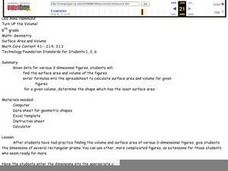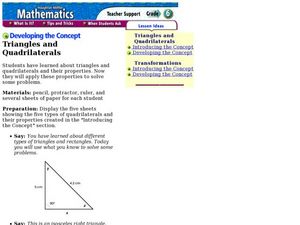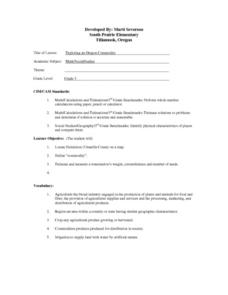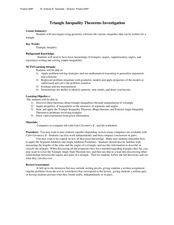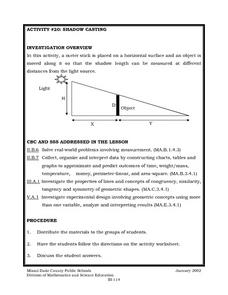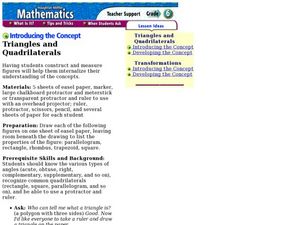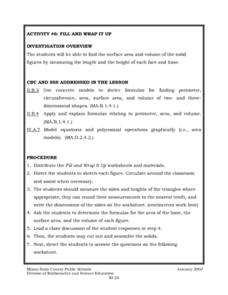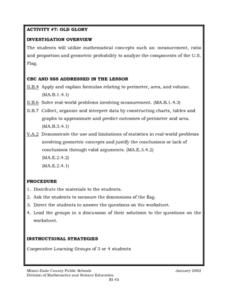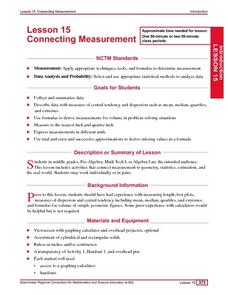Curated OER
Frost Depth Study
Students complete activities to study the frost and frost depth. In this frost study lesson, students use frost tubes to study and measure the frost at their school. Students measure the frost in the tube and enter their data online to...
Curated OER
Turn Up the Volume
Measuring volume can be a mystery for 5th graders, but this hands-on activity gives the gift of discovery. The volume of simple rectangular solids and irregular shapes are calculated through various methods including displacing liquid in...
Curated OER
Who's On First?
Have you ever considered why the number 10 is so important to us? That's what learners do here. They explore patterns formed by powers of ten and by decimals, convert units of measure within the metric system, and express these in the...
Curated OER
Perimeter
Students study about perimeter and the units used to measure perimeter using a variety of materials including their hands, feet, rulers, and computer applets. They understand such attributes as length, area, weight, volume, and size of...
Shodor Education Foundation
Volume of Prisms
Explore the concept of volume of prisms using an applet to perform the calculations. The link to the interactive applet is embedded into the lesson plan as well as a link to associated data sheets. Get your math class to the computer lab...
Houghton Mifflin Harcourt
Developing the Concept: Triangles and Quadrilaterals
Exact narrative and examples make this lesson on polygons easy to implement. Through it, your class will learn how to use a protractor and ruler to construct triangles and quadrilaterals according to your directions. Your class will be...
Curated OER
Pacing a Gunther Chain
Students pace a Gunther Chain, a measurement used by foresters to determine distance and area. They discuss that pacing is individualized depending on age, gender, etc. They practice to find an average pace. Teams estimate, pace and...
Curated OER
Pythagorean Theorem
In this measurement lesson, learners examine the Pythagorean Theorem, perimeter, and areas of right triangles. They record their measurements and research their findings on a grid.
Curated OER
Exploring and Oregon Commodity
A fun (and delicious!) lesson teaches measurement to your third graders. They work in small groups to first predict, then to measure the weight, circumference, and number of seeds found in a watermelon. Everyone gets to eat watermelon...
Curated OER
Angles - Digger and the Gang
Students explore angle estimation and measurement. In this angle lesson, students define obtuse, acute, and right angles, and practice measuring angles using a protractor. Students participate in an online angle estimation activity.
Shodor Education Foundation
Surface Area of Rectangular Prism
With this interactive lesson, learners compute the surface area of rectangular prisms. They visit an online investigation applet and record data on the provided handout. Pair this lesson with the volume lesson by the same publisher as an...
Curated OER
Introducing the Concept: Proportions
Students measure distances. In this proportions lesson, students use a map to find how far it is between different cities. Students use their knowledge of measurement, multiplication and fractions to find the distances.
Curated OER
One Hundred Things
Learners practice estimating by handling items in groups of ten. They visualize how much space 100 items, such as pennies, peas, or beans, will take up after holding 10 of them. Students measure the difference in volume between 10 and...
Curated OER
Triangle Inequality Theorems Investigation
Students estimate and measure triangles. In this geometry lesson, students identify the relationship between three sides and a triangle. They use the inequality theorem to decide if a triangle will be formed or not.
Curated OER
Pumpkin Problems
Students participate in a lesson that has the intention of working on estimation skills. They use pumpkins to estimate the number of seeds are inside. They collect data for each pumpkin and compare it to the estimation. Students question...
Curated OER
How Big Is Your Head?
Learners explore measurement by measuring classmates' heads. They record their measurements and they put the measurements in order from smallest to largest. Students figure the mean, median, mode, maximum, minimum, and range of their...
Curated OER
Vectors: How Much Force Can You Apply
This lesson entails the viewing of two videos to get an overview of force and its application. The lesson covers how vectors use force in real-world situations.
Curated OER
Shadow Casting
Eighth graders use a meter stick that is placed on a horizontal surface and an object is moved along it so that the shadow length can be measured at different distances from the light source. They solve real-world problems involving...
Curated OER
Volume of a Cylinder
Middle and high schoolers calculate the volume of cylinders. They measure the height, radius and diameter of cylinders. Following given formulas, learners calculate the area and volume of the cylinder. They compare cylinders and predict...
Houghton Mifflin Harcourt
Introducing the Concept: Triangles and Quadrilaterals
Guide your geometers through the process of constructing polygons. They learn how to draw triangles, squares, parallelograms, rectangles, rhombuses, and trapezoids with specified angles using a protractor and a ruler. The lesson plan...
Curated OER
Fill and Wrap It Up
Students find the surface area and volume of the solid figures by measuring the length and the height of each face and base. They use concrete models to derive formulas for finding perimeter, circumference, area, surface area, and volume...
Curated OER
Old Glory
Learners utilize mathematical concepts such as: measurement, ratio and proportion and geometric probability to analyze the components of the U.S. Flag. They collect, organize and interpret data by constructing charts, tables and graphs...
Curated OER
"Math Curse" by Jon Scieszka
Students practice estimation skills for measurement, and work with metric units of measurement.
Curated OER
Connecting Measurement
Students participate in activities the connect measurement to geometry, statistics, estimation, and the real world. They collect measurements from their elbow to the tip of their middle finger and make a box plot of the data as well as...



